高中现在分词的用法
分词的用法总结

分词的用法总结分词是文法中的一种形态变化形式,它将动词原形依照词法规则的要求进行合理而灵活地变化,以适应句子结构和意义的需要。
分词作为英语语法中的一个重要概念,具有多种用法和功能。
本文旨在对分词的用法进行总结,以帮助读者更好地理解和运用分词。
一、现在分词现在分词通常由动词原形加-ing构成,具有形容词和副词的性质,可以作定语、表语、宾语补足语和状语等多种用法。
1. 作定语:现在分词作定语修饰名词,表示被修饰名词的特征、状态或功能。
例如:- The running water is very clean.(跑的水很干净。
)- He is a hard-working student.(他是一个勤奋的学生。
)2. 作表语:现在分词作表语,说明主语的特征或状态。
例如:- The weather today is warm.(今天的天气很暖和。
)3. 作宾语补足语:现在分词作宾语补足语,说明宾语的特征、状态或结果。
例如:- I found him lying on the ground.(我发现他躺在地上。
)4. 作状语:现在分词作状语,表示时间、原因、方式、条件等。
例如:- Walking along the street, she suddenly saw her old friend.(她走在街上,突然看到了她的老朋友。
)- Being tired, I went to bed early.(我累了,早早上床睡觉。
)二、过去分词过去分词通常由动词原形加上-ed或-en构成,具有形容词的性质,可以作定语、表语、宾语补足语和状语等多种用法。
1. 作定语:过去分词作定语,修饰名词或代词,表示被修饰词的特征、状态或情况。
例如:- The broken window needs to be repaired.(这个破窗户需要修理。
)- The lost key has been found.(丢失的钥匙已经找到了。
(完整版)现在分词的七种用法
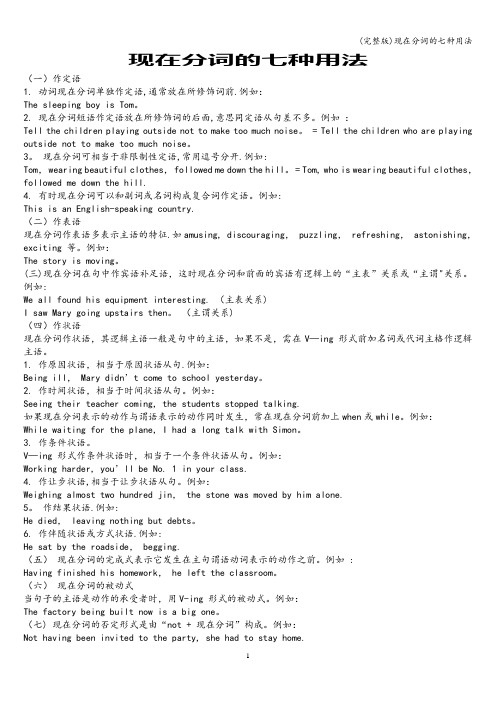
现在分词的七种用法(一)作定语1. 动词现在分词单独作定语,通常放在所修饰词前.例如:The sleeping boy is Tom。
2. 现在分词短语作定语放在所修饰词的后面,意思同定语从句差不多。
例如:Tell the children playing outside not to make too much noise。
= Tell the children who are playing outside not to make too much noise。
3。
现在分词可相当于非限制性定语,常用逗号分开.例如:Tom, wearing beautiful clothes, followed me down the hill。
= Tom, who is wearing beautiful clothes,followed me down the hill.4. 有时现在分词可以和副词或名词构成复合词作定语。
例如:This is an English-speaking country.(二)作表语现在分词作表语多表示主语的特征.如amusing, discouraging, puzzling, refreshing, astonishing,exciting 等。
例如:The story is moving。
(三)现在分词在句中作宾语补足语,这时现在分词和前面的宾语有逻辑上的“主表”关系或“主谓"关系。
例如:We all found his equipment interesting. (主表关系)I saw Mary going upstairs then。
(主谓关系)(四)作状语现在分词作状语,其逻辑主语一般是句中的主语,如果不是,需在V—ing 形式前加名词或代词主格作逻辑主语。
1. 作原因状语,相当于原因状语从句.例如:Being ill,Mary didn’t come to school yesterday。
现在分词知识点总结
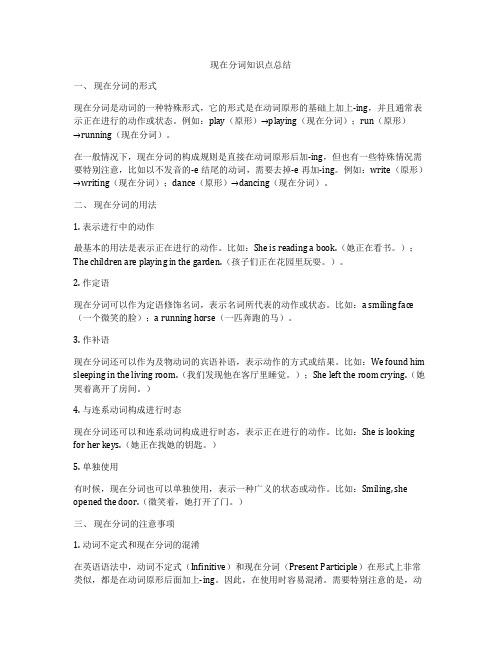
现在分词知识点总结一、现在分词的形式现在分词是动词的一种特殊形式,它的形式是在动词原形的基础上加上-ing,并且通常表示正在进行的动作或状态。
例如:play(原形)→playing(现在分词);run(原形)→running(现在分词)。
在一般情况下,现在分词的构成规则是直接在动词原形后加-ing,但也有一些特殊情况需要特别注意,比如以不发音的-e结尾的动词,需要去掉-e再加-ing。
例如:write(原形)→writing(现在分词);dance(原形)→dancing(现在分词)。
二、现在分词的用法1. 表示进行中的动作最基本的用法是表示正在进行的动作。
比如:She is reading a book.(她正在看书。
);The children are playing in the garden.(孩子们正在花园里玩耍。
)。
2. 作定语现在分词可以作为定语修饰名词,表示名词所代表的动作或状态。
比如:a smiling face (一个微笑的脸);a running horse(一匹奔跑的马)。
3. 作补语现在分词还可以作为及物动词的宾语补语,表示动作的方式或结果。
比如:We found him sleeping in the living room.(我们发现他在客厅里睡觉。
);She left the room crying.(她哭着离开了房间。
)4. 与连系动词构成进行时态现在分词还可以和连系动词构成进行时态,表示正在进行的动作。
比如:She is looking for her keys.(她正在找她的钥匙。
)5. 单独使用有时候,现在分词也可以单独使用,表示一种广义的状态或动作。
比如:Smiling, she opened the door.(微笑着,她打开了门。
)三、现在分词的注意事项1. 动词不定式和现在分词的混淆在英语语法中,动词不定式(Infinitive)和现在分词(Present Participle)在形式上非常类似,都是在动词原形后面加上-ing。
高中英语知识点归纳分词的用法

高中英语知识点归纳分词的用法分词是英语语法中的一个重要知识点,它有着广泛的应用。
在高中英语学习中,掌握分词的用法对于学生的语言运用能力和阅读理解能力都有着极大的帮助。
本文将对高中英语中分词的用法进行归纳总结。
一、分词的定义分词是一种非常特殊的动词形式,它既有动词的特点,又具有形容词或副词的特点。
分词的形式有两种:现在分词(-ing形式)和过去分词(-ed形式)。
在句子中,分词可以作定语、表语、宾语补足语等。
下面将分别介绍这些用法。
二、现在分词的用法1.作定语现在分词可以修饰名词或代词,表示被修饰词的性质、特征或状态。
例如:a running horse(一匹奔跑的马)、a smiling child(一个微笑的孩子)。
2.作表语现在分词可以作为连系动词的表语,表示主语的特征或状态。
例如:She is amazing(她很令人惊叹)。
3.作状语现在分词可以修饰谓语动词,表示动作的方式、原因或时间。
例如:He left, crying(他边哭边离开)。
三、过去分词的用法1.作定语过去分词可以修饰名词或代词,表示被修饰词的性质、特征或状态。
例如:a broken window(一个破损的窗户)、a written report(一份书面报告)。
2.作表语和状语过去分词也可以作为连系动词的表语,表示主语的特征或状态。
例如:The door was closed(门是关着的)。
过去分词还可以修饰谓语动词,表示动作的结果。
例如:She arrived, tired(她疲惫地到达了)。
四、分词的完成时态在句子中,分词还可以和助动词have、has、had连用,形成完成时态。
一般现在分词加上have/has构成现在完成分词,过去分词加上had构成过去完成分词。
例如:Having finished his homework, he went to bed(做完作业后,他去睡觉了)。
五、现在分词和过去分词的区别现在分词和过去分词的区别主要在于时间和动作性质。
现在分词的用法细解

现在分词的用法详解现在分词(Present Participle)(又称-ing形式、现在进行式) ,是分词的一种,分词又分为现在分词和过去分词,它们都是非限定动词,即在句子里面不能单独充当谓语,但能充当其它的一些成分(定语,表语,补语和状语),并且它们具有动词的性质,所以又是类动词的一种。
一.构成形式doing (特殊的略)现在分词表示主动的或进行的动作二.时态与语态一般式doing一般被动式being done完成式having done完成被动式having been done所有否定式都是在-ing前面加not包括独立主格形式三.可作成分定语状语补语表语1.作定语1)单个分词作定语——所修饰名词前,表示主动或者进行的状态可以改写成一个定语从句,把修饰的名词提前做先行词,再补引导词。
E.g. China is a developing country. = China is a country which isdeveloping.2)分词短语作定语——名词放在后面,此时就是相当于定语从句省略了引导词(that, which, what, who, whom...),而先行词就是该修饰的名词,所以该名词与现在分词之间存有逻辑上的主谓关系Students wishing to go hiking should sign their names here.=Students who is wishing to go hiking should sign their names here.注意1:分词的完成时(having done, having been done)不可作定语,但是可以用定语从句表示E.g. Do you know anything about the accident having happened yesterday? ( wrong )Do you know anything about the accident that happened yesterday? ( right )注意2:在message, letter, sign, news, notice等词后要用现在分词作定语不用过去分词这是考试的易错点2.作宾语补足语记住:只有两类动词可以加现在分词作宾补1)感官动词(和听觉,视觉,触觉相关的动词,此时现在分词表示正在进行):see,hear ,watch,feel,notice,observe, find,listen,to look at2)使役动词(动词+宾语+doing, 此时现在分词表示“使处于某种状态”):have, get, catch, leave, set, keepeg.I saw him singing now.Don't have the students studying all day.注意1:宾语与作宾补的现在分词之间存在逻辑上的主谓关系即宾语是现在分词动作的发出者注意2:使役动词后面跟的动词还有do/to do/done 的情况,要根据情况选择合适的动词结构。
(完整版)现在分词的用法

He chanced taking part in that race.Cannot help to do表示不能帮忙做某事;Cannot help doing表示情不自禁,不由得做某事如:I cannot help to do homework for you.I cannot help laughing.4.作介词宾语除了我们已经谈到的“疑问词+不定式”可以作介词宾语外。
通常情况下,只能用-ing分词作介词的宾语。
但个别表示“除了。
之外”的介词如“except, but, than”通常接不定式。
如:I can do nothing except/but wait.后面跟-ing分词作介词宾语的短语结构主要有:A)“动词+介词+动名词”I am used to sleeping on the floor.(习惯于。
)I am looking forward to meeting you.The rain stopped us from working.She objected to marrying him(反对)B)“形容词+介词+-ing分词”I am interested in playing basketball.Tom is responsible for breaking the glass.C)"名词+介词+动名词"There are many ways to do it/of doing it.He didn't go out for fear of raining.-ing分词的惯用搭配有:A)主语+have+fun/pleasure/a good time/trouble/difficulty+(in) doing sth如:We had a lot of fun (in) playing basketball.I have trouble/difficulty(in) understanding him.B)“There is+difficulty/trouble/pleasure+(in) doing sth”如:There is difficulty in passing the exam.There is trouble in learning a foreigh language.C)“be busy+(in) doing sth”I am busy in doing my homework.D) “What about/How about +-ing分词”(征求意见句型。
现在分词的用法举例说明

现在分词的用法举例说明一、基础概念现在分词是英语中的一种非谓语动词形式,它由动词的原形加上-ing构成。
在句子中,现在分词可以作为主语、宾语、定语、状语等,并且能够表示与主句同步发生或者先于主句发生的动作。
下面将详细介绍现在分词的几种常见用法以及相应的举例。
二、现在分词作主语1. 用于表示一种习惯性或重复性的动作- Swimming is good exercise.(游泳是良好的运动。
)- Reading helps to improve vocabulary.(阅读有助于提高词汇量。
)2. 用于强调被动- Being ignored by others hurts her feelings.(被他人忽视伤了她的感情。
)- Seeing her name on the list surprised him.(看到她名字在名单上让他吃惊。
)3. 用于表达感叹- Amazing the crowd with his performance, he received a standing ovation.(他以他表演震撼了观众,赢得了起立鼓掌。
)- Shocking the world with its innovation, this product became an instant success.(这个产品通过其创新震惊了整个世界,取得了即时的成功。
)三、现在分词作宾语补足语1. 表示正在进行的动作或状态- I enjoy swimming in the ocean.(我喜欢在海里游泳。
)- She kept talking, ignoring my advice.(她不停地说话,无视我的建议。
)2. 表示过去的动作比较长,即主句中的谓语动词发生在分词之后- They left the party, laughing and joking.(他们离开这个聚会时忍不住大笑起来。
)- The children entered the room, holding hands and singing songs.(孩子们手牵手唱着歌走进房间。
分词的四种形式及用法

分词的四种形式及用法分词是动词的一种形式,可以用作动词、形容词、副词或短语的一部分。
常见的分词有以下四种形式和用法:1. 现在分词(-ing分词):- 用作动词:现在分词可以和be动词连用,构成进行时态。
例如:She is going to school.(她正在去学校的路上)- 用作形容词:现在分词可以修饰名词,表示正在进行的动作或状态。
例如:The running water is refreshing.(流动的水很清凉)2. 过去分词(-ed分词):- 用作动词:过去分词可以和助动词或情态动词连用,构成完成时态或被动语态。
例如:He has eaten lunch.(他吃过午饭了)- 用作形容词:过去分词可以修饰名词,表示被动或完成的动作。
例如:The broken glass needs to be cleaned up.(需要清理的破碎玻璃)- 用作副词:过去分词可以修饰动词,表示原因或伴随状态。
例如:She watched him, amazed.(她惊讶地看着他)3. 不定式(to分词):- 用作动词:不定式作为动词的分词形式,可以表示将要发生的动作。
例如:They are going to leave soon.(他们快要离开了)- 用作形容词:不定式可以修饰名词,表示目的或用途。
例如:She needs a book to read.(她需要一本书来阅读)-用作副词:不定式可以修饰动词,表示目的或结果。
4.分词短语:- 用作动词:分词短语作为动词的一部分,可以表示时间、原因、条件等。
例如:Hearing the news, she cried.(听到消息,她哭了)- 用作形容词:分词短语可以修饰名词,表示状态或特征。
例如:The students studying in the library are quiet.(在图书馆学习的学生都很安静)-用作副词:分词短语可以修饰动词,表示方式或条件。
2022届高三英语一轮语法知识梳理之现在分词的用法
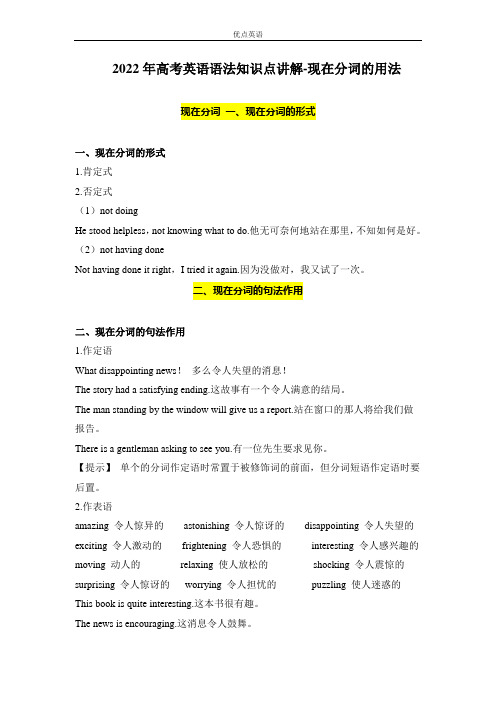
2022年高考英语语法知识点讲解-现在分词的用法现在分词一、现在分词的形式一、现在分词的形式1.肯定式2.否定式(1)not doingHe stood helpless,not knowing what to do.他无可奈何地站在那里,不知如何是好。
(2)not having doneNot having done it right,I tried it again.因为没做对,我又试了一次。
二、现在分词的句法作用二、现在分词的句法作用1.作定语What disappointing news!多么令人失望的消息!The story had a satisfying ending.这故事有一个令人满意的结局。
The man standing by the window will give us a report.站在窗口的那人将给我们做报告。
There is a gentleman asking to see you.有一位先生要求见你。
【提示】单个的分词作定语时常置于被修饰词的前面,但分词短语作定语时要后置。
2.作表语amazing 令人惊异的astonishing 令人惊讶的disappointing 令人失望的exciting 令人激动的frightening 令人恐惧的interesting 令人感兴趣的moving 动人的relaxing 使人放松的shocking 令人震惊的surprising 令人惊讶的worrying 令人担忧的puzzling 使人迷惑的This book is quite interesting.这本书很有趣。
The news is encouraging.这消息令人鼓舞。
3.作宾语补足语(1)作及物动词的宾语补足语用现在分词作宾补的动词:bring 引起catch 碰上(撞上)discover 发现feel 感觉find 发现get 使have 使hear 听见keep 使leave 听任listen to 听着look at 看着notice 注意到observe 观察see 看见send 使(突然做某事)set 引起(做某事)start 使(开始做某事)watch 观看His letter left me feeling pretty humble.他的信使我感到自己很卑微。
现在分词的用法
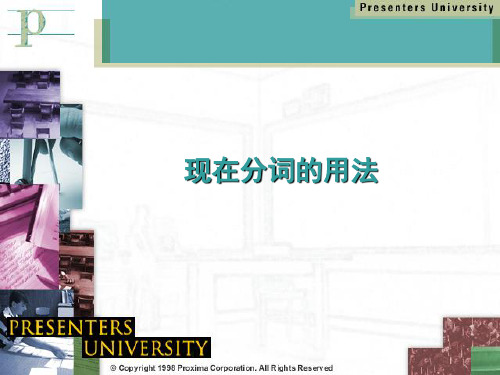
•
我听见铃在响
1. 感官动词see, watch, hear, feel,
notice等后接现在分词作宾语补足语, 表示该动作正在进行。
• I saw him running down the street. 我 看见他沿着街跑。
• I felt an ant climbing over my leg. 我 感到一只蚂蚁正在我的腿上爬。
三)现在分词在句中作宾语 补足语
• We all found his equipment interesting. 我们发现他的装备很有趣
• I saw Mary going upstairs then. 我看见玛丽上楼去了。
• 现在分词在句子中可用作宾语补足语 ,其结构为:主语+谓语+宾语+现在 分词(即宾语补足语)
• 大雨滂沱,造成了那个国家洪水泛滥
• He cut off the electricity quickly, preventing an accident.
• 他迅速切断了电源,防止了一起意外 事故。
• 5. 条件状语。
• Turning right, you will find the place you want.
• 当我走在街上时,我看到了我的朋友 。
•
• Seeing their teacher coming, the students stopped talking.
• 如果现在分词表示的动作与谓语表示 的动作同时发生,常在现在分词前加 上when或while。例如:
• While waiting for the plane, I had a long talk with Simon.
3. 伴随状语,与谓语所表示的动作 同时发生。
现在分词的用法
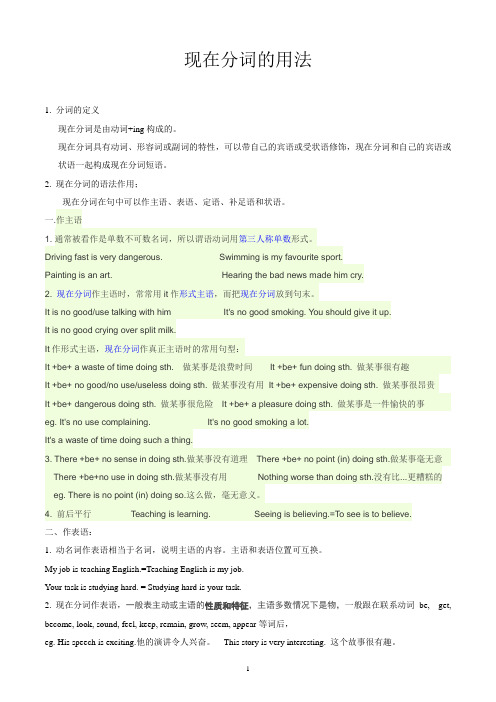
现在分词的用法1. 分词的定义现在分词是由动词+ing构成的。
现在分词具有动词、形容词或副词的特性,可以带自己的宾语或受状语修饰,现在分词和自己的宾语或状语一起构成现在分词短语。
2. 现在分词的语法作用;现在分词在句中可以作主语、表语、定语、补足语和状语。
一.作主语1. 通常被看作是单数不可数名词,所以谓语动词用第三人称单数形式。
Driving fast is very dangerous. Swimming is my favourite sport.Painting is an art. Hearing the bad news made him cry.2. 现在分词作主语时,常常用it作形式主语,而把现在分词放到句末。
It is no good/use talking with him It's no good smoking. You should give it up.It is no good crying over split milk.It作形式主语,现在分词作真正主语时的常用句型:It +be+ a waste of time doing sth. 做某事是浪费时间It +be+ fun doing sth. 做某事很有趣It +be+ no good/no use/useless doing sth. 做某事没有用It +be+ expensive doing sth. 做某事很昂贵It +be+ dangerous doing sth. 做某事很危险It +be+ a pleasure doing sth. 做某事是一件愉快的事eg. It's no use complaining. It's no good smoking a lot.It's a waste of time doing such a thing.3. There +be+ no sense in doing sth.做某事没有道理There +be+ no point (in) doing sth.做某事毫无意There +be+no use in doing sth.做某事没有用Nothing worse than doing sth.没有比...更糟糕的eg. There is no point (in) doing so.这么做,毫无意义。
现在分词的用法

现在分词的用法一.作定语现在分词作定语表示它所修饰的名词的动作或状态,与所修饰的名词之间有逻辑上的主谓关系。
1.单个现在分词作定语时,放在所修饰的名词前面The sleeping boy is Tom.China is a developing country.2.现在分词短语作定语时,通常放在所修饰的名词后面,可以转化成定语从句。
The girl sitting beside me is my cousin.=The girl who is sitting beside me is my cousin.二.作状语现在分词作状语表示主语在进行某一动作的同时所进行的另一动作,它对谓语动词起修饰或陪衬作用。
1.作时间状语(可转换成when或while等引导的时间状语从句)Hearing the news,they all jumped with a joy.=When they heard the news, they all jumped with a joy.2.作原因状语(可转化成because ,as 等引导的原因状语从句)Not having done his homework, he stayed at home.=As he has not done his homework, he stayed at home.3.作条件状语(可转化成if ,unless 等条件状语从句)Using your head,you will find a way.=If you use your head,you will find a way.4.作让步状语(可转化成though,even if /even though等引导让步状语从句)Getting up early,he still missed the early bus.=Even if he got up early ,he still missed the early bus.5.作伴随状语(可转化成并列句)He sat in the armchair,reading a newspaper.=He sat in the armchair and read a newspaper. 6.作结果状语(可转化为so that 引导的结果状语从句)The old man died,leaving nothing to his children.=The old man died,so that he left nothing to his children.作业题1._______(arrive) in Qingdao,I lost my way.2.His father died,______(leave) three children.3.The dancer _______(perform) on the stage is called Amy.4.Cars have become a popular means of transport ,bring great convenience to our life.5.You will have chances to improve your speak English in the courses.句子翻译1.I can’t live in fear of the possibility that as the earth’s population grows and we use more and more of our nonrenewable (不可再生的)resources,our children may have to lead poorer lives.2.However,those of us who are parents of children in this age group know that such offers are relatively rare and that many liberal- arts students (文科生) graduate with the belief that the prospective workplace may not have a place for them.3.I have known changes for the better and changes for the worse , but I have never questioned the fact that whether Iike it or not ,change was unavoidable.4.Tales from Animal Hospital will delight all fans of the programme and anyone who was a lively interest in their pet,whether it be a cat、dog or snake!5.They had no connection with the outside world for more than a thousand years,giving them plenty of time to build more than 1000 huge stone figures ,called moat, for which the island is most famous.答案1.arriving 2.leaving 3.performing 4. bring改成bringing 5.speak 改成speaking翻译答案1.我不能总是生活在这种可能性的忧虑中:由于地球人口的不断增长,我们正在消耗掉越来越多的非再生资源,我们的孩子可能不得不过着更加贫困的生活。
(完整版)最全动词现在分词最常见现在分词的用法
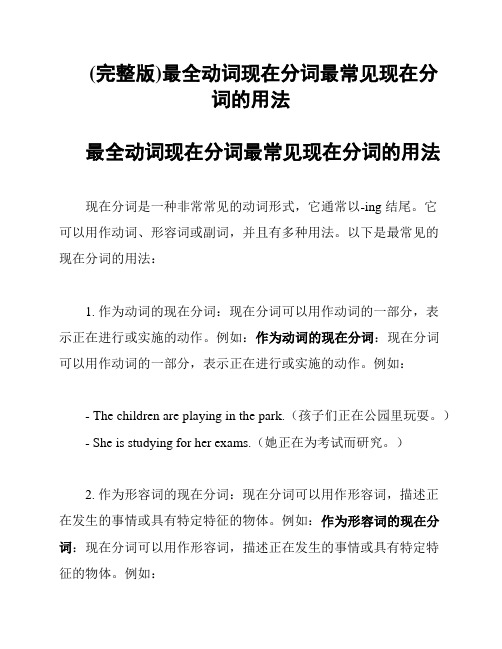
(完整版)最全动词现在分词最常见现在分词的用法最全动词现在分词最常见现在分词的用法现在分词是一种非常常见的动词形式,它通常以-ing 结尾。
它可以用作动词、形容词或副词,并且有多种用法。
以下是最常见的现在分词的用法:1. 作为动词的现在分词:现在分词可以用作动词的一部分,表示正在进行或实施的动作。
例如:作为动词的现在分词:现在分词可以用作动词的一部分,表示正在进行或实施的动作。
例如:- The children are playing in the park.(孩子们正在公园里玩耍。
)- She is studying for her exams.(她正在为考试而研究。
)2. 作为形容词的现在分词:现在分词可以用作形容词,描述正在发生的事情或具有特定特征的物体。
例如:作为形容词的现在分词:现在分词可以用作形容词,描述正在发生的事情或具有特定特征的物体。
例如:- The running water is very refreshing.(流动的水很清凉。
)- The smoking chimney indicated that someone was home.(冒烟的烟囱表明有人在家。
)3. 作为副词的现在分词:现在分词可以用作副词,修饰或限定动词或形容词。
例如:作为副词的现在分词:现在分词可以用作副词,修饰或限定动词或形容词。
例如:- She walked into the room, smiling warmly.(她进入房间,笑得很温暖。
)- He spoke confidently, reassuring the audience.(他自信地讲话,安抚了观众。
)4. 表示原因或结果:现在分词可以表示前面所述动作的原因或结果。
通常放在句子的开头或结尾用来引起相应的感情或行为。
例如:表示原因或结果:现在分词可以表示前面所述动作的原因或结果。
通常放在句子的开头或结尾用来引起相应的感情或行为。
例如:- Being tired, she decided to take a nap.(因为累了,她决定小睡一会儿。
现在分词用法总结
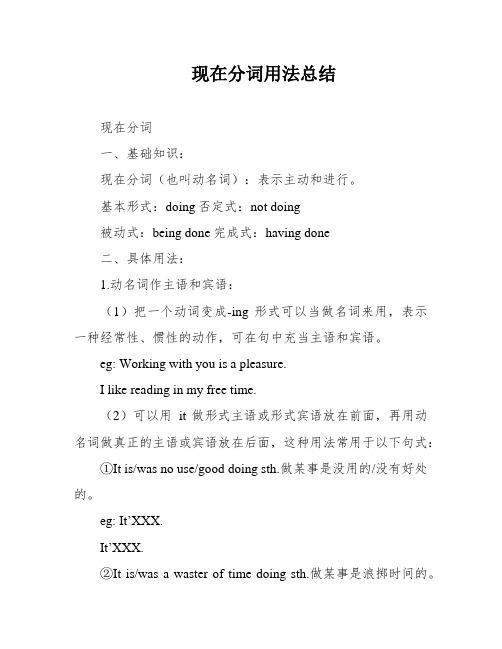
现在分词用法总结现在分词一、基础知识:现在分词(也叫动名词):表示主动和进行。
基本形式:doing否定式:not doing被动式:being done完成式:having done二、具体用法:1.动名词作主语和宾语:(1)把一个动词变成-ing形式可以当做名词来用,表示一种经常性、惯性的动作,可在句中充当主语和宾语。
eg: Working with you is a pleasure.I like reading in my free time.(2)可以用it做形式主语或形式宾语放在前面,再用动名词做真正的主语或宾语放在后面,这种用法常用于以下句式:①It is/was no use/good doing sth.做某事是没用的/没有好处的。
eg: It’XXX.It’XXX.②It is/was a waster of time doing sth.做某事是浪掷时间的。
eg: It XXX’homework.③It is/was XXX.做某事是值得的。
eg: It XXX.④There is/was no sense in doing sth.做某事是没有道理的/意义的。
eg: There is no sense in arguing with your wife.⑤There is/was no point (in) doing sth.做某事是没用的/无意义的。
eg: There is no point in getting angry.⑥There XXX.做某事是不丢脸的。
eg: XXX.⑦There is no telling…无法预言会…eg: XXX.※注意:动名词作主语时,其前可用名词一切格和描述词性物主代词润饰,即one’XXX.作主语。
eg: XXX’XXX.My going to Beijing University is XXX.(3)动名词作宾语分为两种情况:动名词后的宾语和介词后的宾语①有些动词后只能接动名词作宾语,常见的有:avoid, advise, allow, admit, appreciate, consider, deny, enjoy, keep, finish, suggest,dislike, delay, risk, escape, imagine, mind,miss, permit, practice, fancy, can’t help, bebusy, give up, can’t stand, feel like等。
现在分词与过去分词的用法
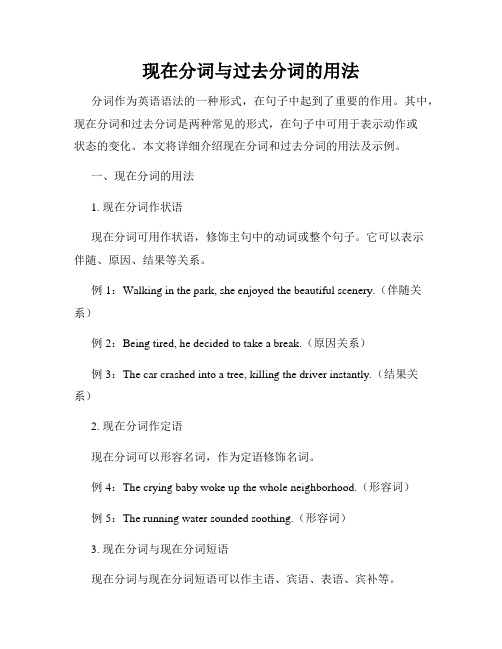
现在分词与过去分词的用法分词作为英语语法的一种形式,在句子中起到了重要的作用。
其中,现在分词和过去分词是两种常见的形式,在句子中可用于表示动作或状态的变化。
本文将详细介绍现在分词和过去分词的用法及示例。
一、现在分词的用法1. 现在分词作状语现在分词可用作状语,修饰主句中的动词或整个句子。
它可以表示伴随、原因、结果等关系。
例1:Walking in the park, she enjoyed the beautiful scenery.(伴随关系)例2:Being tired, he decided to take a break.(原因关系)例3:The car crashed into a tree, killing the driver instantly.(结果关系)2. 现在分词作定语现在分词可以形容名词,作为定语修饰名词。
例4:The crying baby woke up the whole neighborhood.(形容词)例5:The running water sounded soothing.(形容词)3. 现在分词与现在分词短语现在分词与现在分词短语可以作主语、宾语、表语、宾补等。
例6:Smiling is contagious.(主语)例7:I saw him playing basketball in the park.(宾语)例8:Her main duty is taking care of the patients.(表语)例9:They kept the fire burning all night.(宾补)二、过去分词的用法1. 过去分词作定语过去分词可以修饰名词,作为定语使用。
例10:The broken window has been fixed.(形容词)例11:I visited the abandoned house yesterday.(形容词)2. 过去分词与过去分词短语过去分词与过去分词短语可以用作被动语态、完成时态、副词等。
现在分词作状语的七种用法
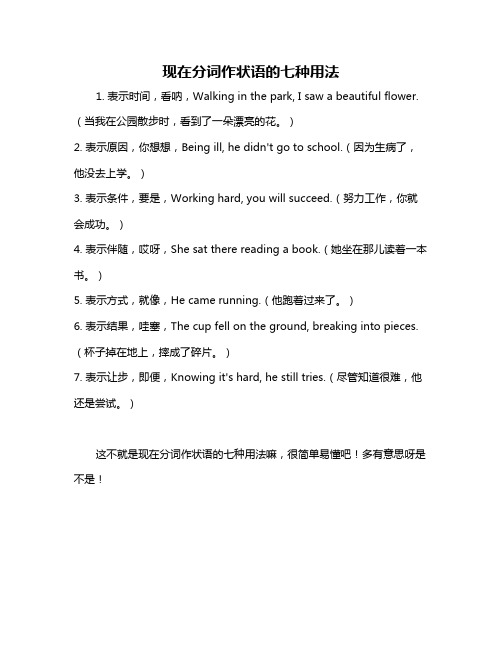
现在分词作状语的七种用法
1. 表示时间,看呐,Walking in the park, I saw a beautiful flower.(当我在公园散步时,看到了一朵漂亮的花。
)
2. 表示原因,你想想,Being ill, he didn't go to school.(因为生病了,他没去上学。
)
3. 表示条件,要是,Working hard, you will succeed.(努力工作,你就会成功。
)
4. 表示伴随,哎呀,She sat there reading a book.(她坐在那儿读着一本书。
)
5. 表示方式,就像,He came running.(他跑着过来了。
)
6. 表示结果,哇塞,The cup fell on the ground, breaking into pieces.(杯子掉在地上,摔成了碎片。
)
7. 表示让步,即便,Knowing it's hard, he still tries.(尽管知道很难,他还是尝试。
)
这不就是现在分词作状语的七种用法嘛,很简单易懂吧!多有意思呀是不是!。
高中语法技巧正确使用现在分词短语
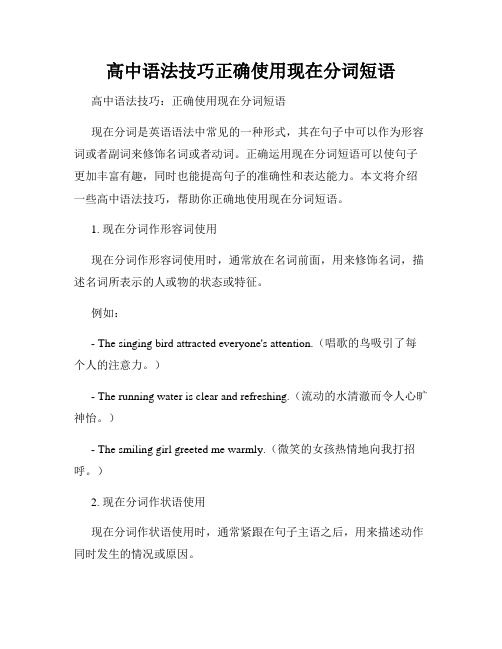
高中语法技巧正确使用现在分词短语高中语法技巧:正确使用现在分词短语现在分词是英语语法中常见的一种形式,其在句子中可以作为形容词或者副词来修饰名词或者动词。
正确运用现在分词短语可以使句子更加丰富有趣,同时也能提高句子的准确性和表达能力。
本文将介绍一些高中语法技巧,帮助你正确地使用现在分词短语。
1. 现在分词作形容词使用现在分词作形容词使用时,通常放在名词前面,用来修饰名词,描述名词所表示的人或物的状态或特征。
例如:- The singing bird attracted everyone's attention.(唱歌的鸟吸引了每个人的注意力。
)- The running water is clear and refreshing.(流动的水清澈而令人心旷神怡。
)- The smiling girl greeted me warmly.(微笑的女孩热情地向我打招呼。
)2. 现在分词作状语使用现在分词作状语使用时,通常紧跟在句子主语之后,用来描述动作同时发生的情况或原因。
例如:- Being late, he missed the train.(因为迟到了,他错过了火车。
)- Feeling tired, she decided to take a nap.(感到疲倦,她决定打个盹。
)- Seeing the dark clouds, we knew it would rain soon.(看到乌云,我们知道很快就会下雨。
)3. 过去分词和现在分词的区别过去分词和现在分词在形式上很相似,但在用法上有所区别。
过去分词通常用来描述已经完成的动作或者被动的状态,而现在分词通常用来描述正在进行的动作或者主动的状态。
例如:- The broken window needs to be fixed.(需要修理的破窗户。
)- The interesting book is worth reading.(值得一读的有趣书籍。
高中现在分词的用法
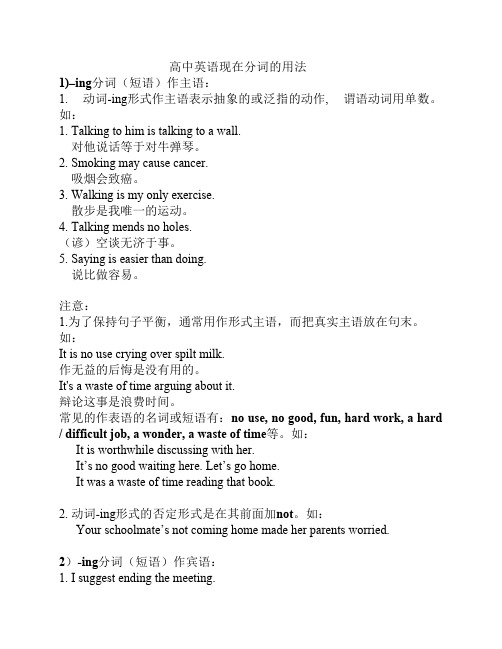
高中英语现在分词的用法1)–ing分词(短语)作主语:1. 动词-ing形式作主语表示抽象的或泛指的动作, 谓语动词用单数。
如:1. Talking to him is talking to a wall.对他说话等于对牛弹琴。
2. Smoking may cause cancer.吸烟会致癌。
3. Walking is my only exercise.散步是我唯一的运动。
4. Talking mends no holes.(谚)空谈无济于事。
5. Saying is easier than doing.说比做容易。
注意:1.为了保持句子平衡,通常用作形式主语,而把真实主语放在句末。
如:It is no use crying over spilt milk.作无益的后悔是没有用的。
It's a waste of time arguing about it.辩论这事是浪费时间。
常见的作表语的名词或短语有:no use, no good, fun, hard work, a hard / difficult job, a wonder, a waste of time等。
如:It is worthwhile discussing with her.It’s no good waiting here. Let’s go home.It was a waste of time reading that book.2. 动词-ing形式的否定形式是在其前面加not。
如:Your schoolmate’s not coming home made her parents worried.2)-ing分词(短语)作宾语:1. I suggest ending the meeting.我建议结束会议。
2. He admitted taking the money.他承认钱是他拿的。
3. I couldn’t help laughing.我禁不住笑了起来。
- 1、下载文档前请自行甄别文档内容的完整性,平台不提供额外的编辑、内容补充、找答案等附加服务。
- 2、"仅部分预览"的文档,不可在线预览部分如存在完整性等问题,可反馈申请退款(可完整预览的文档不适用该条件!)。
- 3、如文档侵犯您的权益,请联系客服反馈,我们会尽快为您处理(人工客服工作时间:9:00-18:30)。
高中英语现在分词的用法
1)- ing分词(短语)作主语:
1. 动词-ing 形式作主语表示抽象的或泛指的动作, 谓语动词用单数。
如:
1. Talking to him is talking to a wall. 对他说话等于对牛弹琴。
2. Smoking may cause cancer.
吸烟会致癌。
3. Walking is my only exercise. 散步是我唯一的运动。
4. Talking mends no holes. (谚)空谈无济于事。
5. Saying is easier than doing.
说比做容易。
1. 为了保持句子平衡,通常用作形式主语,而把真实主语放在句末。
如:It is no use crying over spilt milk.
作无益的后悔是没有用的。
It's a waste of time arguing about it.
辩论这事是浪费时间。
常见的作表语的名词或短语有:no use, no good, fun, hard work, a hard / difficult job, a wonder, a waste of time 等。
如:
It is worthwhile discussing with her.
It 's no good waiting here. Let 's go home.
It was a waste of time reading that book.
2. 动词-ing形式的否定形式是在其前面加not。
如:
Your schoolmate 's not coming home made her parents worried.
2)-ing 分词(短语)作宾语:
1. I suggest ending the meeting.
我建议结束会议。
2. He admitted taking the money.
他承认钱是他拿的
3. I couldn ' t help laughing.
我禁不住笑了起来。
4. Your coat needs brushing. 你的大衣需要刷一下。
1. 有些动词如admit, avoid, consider, escape, deny, risk, suggest 等后要接动词-ing 形式作宾语,而不能接动词不定式。
如:
We' re considering visinitg the Museum.
2. 有些短语如can' t help, be used to, end up, feel like, lead to, be busy, be tired of, be fond of, be afraid of, be proud of, think of / about, put off, keep on, insist on, be good at, give up 等后常接名词、代词或动词-ing 形式作宾语。
如:
I am used to living here.
I ' m fond of collecting stamps and coins.
3. need, require, want作需要”解时,后接动词-ing形式作宾语,主动形式表示被动意义,相当于to be done。
如:
The radio needs repairing / to be repaired.
3) -ing 分词(短语)作表语:
His hobby is collecting stamps.
他的爱好是收集邮票。
The problem is quite puzzling.
这个问题很令人困惑。
4) .-ing 形式作定语:
1.单个动词的-ing形式作定语位于被修饰名词的前面,既可以表示被修饰者的作用或功能,也可以表示被修饰者的动作或状态。
如:
building materials
= materials for building 建筑材料
drinking water
= water for drinking 饮用水
a walking stick
= a stick for walking 手杖
a reading room
= a room for reading 阅览室
a writing desk
= a desk for writing 写字台
tiring music
= music that is tiring 烦人的音乐
a surprising result
= a result that is surprising 一个惊人的结果
2. -ing 形式短语作定语时, 放在所修饰的名词之后, 并且在意思上相当于一个定语从句。
如:
They lived in a room facing the stree.t
= They lived in a room that faces the stree.t 他们住在一间面朝街的房子。
The man standing thereis Peter 's father.
= The man who is standing thereis Peter ' s father. 站在那儿的那个人是彼得的父亲。
Anybody swimming in this river will be fined.
= Anybody who is swimming in this river will be fined. 在这条河里游泳的任何一个人都会被罚款。
5) -ing 形式作宾语补足语:
动词-ing 形式作宾语补足语常放在宾语后面,表示一个正在进行的主动性的动作,强调一个过程或一种状态。
如:
When we returned to the school, we found a stranger standing at the entrance.
当我们回到学校时, 发现一个陌生人站在大门口。
We found the snakeeating the eggs. 我们发现蛇正在吃鸡蛋。
I saw a baglying on the ground. 我看到地板上放着一个包。
The bosskept the workers working the whole night. 那老板让工人整夜地工
作。
6) . 作状语
可以表示时间, 原因, 结果,条件, 方式或伴随等。
Using your head, you l fin'd a l good way. 条件
1) Four people en tered the room look ing around in a curious way 伴随= Four
people enter the room and looked around in a curious way.
2) Being poor, he couldn ' t afford a TV S因.
3) Working hard, you ' ll surely suc条e件d.
4) The boy sat in front of the farm-house, cutti ng the bran ch.伴随
5) Heari ng the n ews, he got frighte ned.时间
= When he heard the news, he got frightened.
6) The child slipped and fell, hitting his head against the door. 结果。
